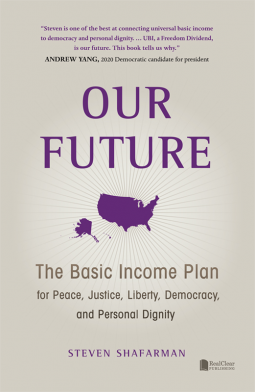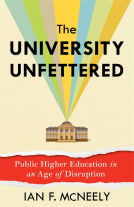
Our Future
The Basic Income Plan for Peace, Justice, Liberty, Democracy, and Personal Dignity
by Steven Shafarman
This title was previously available on NetGalley and is now archived.
Send NetGalley books directly to your Kindle or Kindle app
1
To read on a Kindle or Kindle app, please add kindle@netgalley.com as an approved email address to receive files in your Amazon account. Click here for step-by-step instructions.
2
Also find your Kindle email address within your Amazon account, and enter it here.
Pub Date 16 Jun 2020 | Archive Date 15 Sep 2020
Mascot Books | RealClear Publishing
Talking about this book? Use #OurFuture #NetGalley. More hashtag tips!
Description
There’s a consensus today that people are divided, polarized, nearly tribal, and our government is broken, paralyzed by partisan conflicts. That has to change.
In this conversational, thought-provoking, carefully researched book, Steven Shafarman invites us, unique individuals, to think about what we want for ourselves, our families, and our communities. And he presents a viable plan to unite us, We the People, for real progress toward solving our problems and achieving the country we deserve.
The key is basic income, also called universal basic income or UBI, Citizen Dividends, guaranteed income, negative income tax, or Freedom Dividend. Shafarman is a leading proponent, and has been talking and writing about it since the mid 1980s.
Our Future shows us that basic income is more than money. With any amount, version, or variation, everyone will have monthly reminders that we – each of us, all of us – are equal citizens, with a direct personal stake in working together to make our government trustworthy, effective, and accountable.
Liberals support it as a solid floor beneath the tattered social safety net. Conservatives promote it as a way to cut other programs. It’s imperative, many say, because people are struggling and jobs are disappearing.
Thomas Jefferson and Thomas Paine proposed related ideas, as did Abraham Lincoln and Martin Luther King Jr. The House of Representatives passed a similar plan in 1970 with a bipartisan vote of two-to-one, but the Senate blocked it. Alaskans have a small basic income, the Permanent Fund Dividend, since 1982, and researchers have verified the benefits.
We, individuals and our country, have been trapped for decades in the dysfunctional politics of left versus right, liberals versus conservatives, Democrats versus Republicans. Our Future presents a powerful alternative: We the People versus special interests and the status quo.
We can end hunger, homelessness, and extreme poverty. We can succeed at reforming healthcare, immigration, education, etc., and can slow then stop global warming. We can have a government of, by, and for the people, with liberty and justice for all. We just have to start with basic income. Here’s the plan, with strategies and tactics. This is Our Future.
Advance Praise
“As a long-time proponent, Steven is one of the best at connecting universal basic income to democracy and personal dignity. We must stop confusing economic value and human value, and this book shows us a way to rewrite the rules of the 21st century economy. UBI, a Freedom Dividend, is our future. This book tells us why.” -Andrew Yang, 2020 Democratic candidate for president and New York Times bestselling author of The War on Normal People
“Steven Shafarman has been a leading advocate for basic income since the 1990s. This book reflects the great breadth and depth of his knowledge, with strategies and tactics to build the movement to achieve a basic income for everyone.” -Karl Widerquist, former co-chair of BIEN, the Basic Income Earth Network; associate professor of philosophy at Georgetown University in Qatar
“Our Future is a valuable and accessible presentation of the many advantages of a universal basic income, and contains a lot of information in one place. Congrats to Steven Shafarman for his clarity and passion.” -Jeff Madrick, senior fellow at The Century Foundation and author of Invisible Americans: The Tragic Cost of Child Poverty
“Steven Shafarman’s insights on how as a nation we might provide some form of assured income to all Americans are poignant and pragmatic. In addition to the effective conversational style he uses to lay out his plan, he provides in a comprehensive appendix a guided tour of all key documents and historical developments that relate to this vital topic. He also offers a strategy to inspire effective political action.” -William J. Arnone, chief executive officer, National Academy of Social Insurance
Marketing Plan
media and review outreach
media and review outreach
Available Editions
| EDITION | Hardcover |
| ISBN | 9781645432166 |
| PRICE | US$28.00 (USD) |
Featured Reviews
 Tracy D, Reviewer
Tracy D, Reviewer
I've picked up several e-galleys recently that were, of course, written before the Covid-19 outbreak and in light of our current restrictions and new way of living, just don't seem to hold up in our brave new world. But, I'm happy to report, Steven Shafarman's book, Our Future, is just the opposite. This volume is more important than ever and the Covid crisis, if anything, highlights how beneficial a universal basic income system could be to making our economy more stable through crises. And, with governments around the world instituting some version of this, even if temporarily, it feels like a much less radical idea than it might have seemed just a few months ago. I think that this book has a tremendous amount of appeal for readers interested in policy and how such a system might work. One thing I would suggest, is for the author to do an addendum discussing the current crisis.





